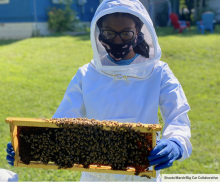Found 6 resources.
Policy Brief
Mon, 04/05/2021

 Shared by Housing Is
on Apr 6, 2021
Shared by Housing Is
on Apr 6, 2021

Summer programs can be essential supports for equitable recovery and accelerating learning. Summer learning programs have the power to be a game changer for youth. Programs can help students re-connect with peers and
caring adults, re-engage in learning, and accelerate students’ social, emotional, and academic recovery.
Early childhood, Education, Grade-level proficiency, Low-income, Out-of-school time, School-readiness, Youth
 Shared by Housing Is
on Apr 6, 2021
Shared by Housing Is
on Apr 6, 2021
Policy Brief
Mon, 04/05/2021

 Shared by Housing Is
on Apr 6, 2021
Shared by Housing Is
on Apr 6, 2021

Summer programs can be essential supports for equitable recovery and accelerating learning. Summer learning programs have the power to be a game changer for youth. Programs can help students re-connect with peers and
caring adults, re-engage in learning, and accelerate students’ social, emotional, and academic recovery.
Early childhood, Education, Grade-level proficiency, Low-income, Out-of-school time, School-readiness, Youth
 Shared by Housing Is
on Apr 6, 2021
Shared by Housing Is
on Apr 6, 2021
Report
Tue, 12/01/2020
 Shared by Housing Is
on Dec 1, 2020
Shared by Housing Is
on Dec 1, 2020
420,000.
Based on the new report, "Lost in the Masked Shuffle & Virtual Void: Children and Youth Experiencing Homelessness Amidst the Pandemic" from SchoolHouse Connection and Poverty Solutions at the University of Michigan, that’s how many fewer children and youth experiencing homelessness have been identified and enrolled by schools so far this school year.
According to our data and insights - gathered from educators and homeless liaisons across 49 states - the number of children, youth, and families experiencing homelessness has likely increased due to the economic crisis. Yet, because of COVID-19 challenges in identifying children and youth experiencing homelessness, hundreds of thousands may not be getting the education and support they need - from internet access, to housing, to food, to child care.
What’s more, only 18% of respondents indicated that federal coronavirus relief education funding provided by the CARES Act is being used to meet the needs of students experiencing homelessness.
To break generational cycles of homelessness, we must take swift action to support the increasing number of children, youth, and families in need. Check out our report to learn more and take action. We have included recommendations for Congressional leaders, state and local educational agencies, homeless, housing, food, and other relief agencies, and philanthropic organizations.
Attendance, Child welfare, Early childhood, Education, Funding, Health, Homelessness, Low-income, Stability, Youth
 Shared by Housing Is
on Dec 1, 2020
Shared by Housing Is
on Dec 1, 2020
News Article
Thu, 02/01/2018
 Shared by Housing Is
on Oct 15, 2020
Shared by Housing Is
on Oct 15, 2020
Chicago’s troubling homicide rate could be significantly reduced through a massive increase in state spending for Chicago schools. That's just one of the proposals floated Monday by a prominent University of Chicago economist Jens Ludwig. With a substantial commitment, he says homicides could be reduced by nearly 60 percent. Illinois is dead last when it comes to the percentage of education dollars provided by the state to its cities. Ludwig believes adding $1.7 billion dollars would not only bring Illinois up to the national average, but could substantially reduce gun violence as well. Given the social science evidence on the link between high school graduation and gun violence, that would be about a 30 percent decrease in the homicide rates in the city of Chicago for something that has absolutely nothing to do with the city of Chicago policies.
Child welfare, Community development, Education, Funding, Legislation & Policy, Preventative care, Youth
 Shared by Housing Is
on Oct 15, 2020
Shared by Housing Is
on Oct 15, 2020
Report
Mon, 11/04/2019
 Shared by Housing Is
on Oct 15, 2020
Shared by Housing Is
on Oct 15, 2020
The ninth in a series of Research-to-Impact briefs by Chapin Hall at the University of Chicago on understanding and addressing youth homelessness.
For the 4.2 million adolescents and young adults who experience some form of homelessness, opportunities to develop and realize their educational aspirations are often disrupted. Missed Opportunities: Education Among Youth and Young Adults Experiencing Homelessness in America highlights research on the intersection between youth homelessness and educational disruption. We learned that young people experiencing family instability and trauma are at increased risk for unstable living situations and interrupted educational experiences. Youth who leave school before graduation were considerably more likely to experience homelessness. Likewise, youth and young adults who experience homelessness were less likely to enroll in college. If we strengthen our educational supports and youth homelessness systems, we can do more than stop missing opportunities; we can ensure that our youth thrive and meet their full potential.
Attendance, Education, Homelessness, Post-secondary, Youth
 Shared by Housing Is
on Oct 15, 2020
Shared by Housing Is
on Oct 15, 2020
Report
Tue, 07/10/2018
 Shared by Steve Lucas
on Jul 10, 2018
Shared by Steve Lucas
on Jul 10, 2018
HUD Administrative Data Linked with the National Health Interview Survey
Asthma, Attendance, Child welfare, Early childhood, Education, Grade-level proficiency, Health, Healthy homes, Home visiting, Housing, Lead, Literacy, Low-income, Medicaid / Medicare, Preventative care, Research, School-readiness, Stability, Vision, Youth
 Shared by Steve Lucas
on Jul 10, 2018
Shared by Steve Lucas
on Jul 10, 2018
Topics
- (-) Remove Education filter Education
- Youth 6 Apply Youth filter
- Early childhood 4 Apply Early childhood filter
- Low-income 4 Apply Low-income filter
- Attendance 3 Apply Attendance filter
- Child welfare 3 Apply Child welfare filter
- Grade-level proficiency 3 Apply Grade-level proficiency filter
- School-readiness 3 Apply School-readiness filter
- Funding 2 Apply Funding filter
- Health 2 Apply Health filter
- Homelessness 2 Apply Homelessness filter
- Out-of-school time 2 Apply Out-of-school time filter
- Preventative care 2 Apply Preventative care filter
- Stability 2 Apply Stability filter
- Asthma 1 Apply Asthma filter
- Community development 1 Apply Community development filter
- Healthy homes 1 Apply Healthy homes filter
- Home visiting 1 Apply Home visiting filter
- Housing 1 Apply Housing filter
- Lead 1 Apply Lead filter
- Legislation & Policy 1 Apply Legislation & Policy filter
- Literacy 1 Apply Literacy filter
- Medicaid / Medicare 1 Apply Medicaid / Medicare filter
- Post-secondary 1 Apply Post-secondary filter
- Research 1 Apply Research filter
- Vision 1 Apply Vision filter

